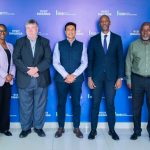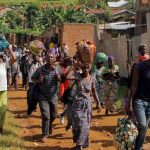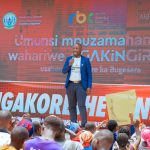The BRICS summit kicks off today, Tuesday (Aug 22 – 24), in Sandton, Johannesburg, South Africa bringing together bloc members to discuss a new world order.
Chinese President Xi Jinping arrived in South Africa on Monday at the city’s O.R. Tambo International Airport at around 11 p.m. local time.
Sergey Lavrov, Minister of Foreign Affairs and Head of Delegation for the Russian Federation arrived on Tuesday morning and was received at the Waterkloof Airforce.
Brazilian President Luiz Inácio Lula da silva arrived in South Africa on Monday accompanied by his spouse, Rosângela da Silva.
Meanwhile, the Chinese leader Xi has expressed high expectations for the upcoming BRICS summit.
Xi noted that BRICS is an important cooperation platform for emerging markets and major developing countries, and its cooperation mechanism has become a constructive force for promoting world economic growth, improving global governance and promoting democracy in international relations.
He said he believes this year’s BRICS summit will be an important milestone in the development of the BRICS cooperation mechanism, elevating solidarity and cooperation among developing countries to a higher level.
This year’s summit is the first in-person BRICS summit for more than three years and the first BRICS summit to be held in Africa for five years.
The BRICS summit is also being attended by leaders from various countries across Africa. They include Excellency Chief Dr Joseph Dion Ngute, Prime Minister of the Republic of Cameroon, Prime Minister Jean-Michel Sama Lukonde of the Democratic Republic of the Congo among others.
Countries Expected to Join BRICS
Over 40 countries, including Iran, Saudi Arabia, United Arab Emirates, Argentina, Algeria, Bolivia, Indonesia, Egypt, Ethiopia, Cuba, Democratic Republic of Congo, Comoros, Gabon, and Kazakhstan have expressed interest in joining the forum, according to 2023 summit chair South Africa.
They view BRICS as an alternative to global bodies viewed as dominated by the traditional Western powers and hope membership will unlock benefits including development finance, and increased trade and investment.
Dissatisfaction with the global order among developing nations was exacerbated by the COVID-19 pandemic when life-saving vaccines were hoarded by the rich countries.
Iran, home to around a quarter of the Middle East’s oil reserves, has said it hopes the mechanism for new membership would be decided “at the earliest.”
Oil heavyweight Saudi Arabia was among more than a dozen countries that participated in “Friends of BRICS” talks in Cape Town in June. It has received backing from Russia and Brazil to join the BRICS.
Argentina said in July 2022 it had received China’s formal support in its bid to join the group.
Ethiopia, one of Africa’s fastest-growing economies, said in June it had asked to join the bloc, with a foreign ministry spokesman saying the country will continue to work with international institutions that can protect its interests.
Bolivia’s President Luis Arce has expressed interest in BRICS membership and is expected to attend the summit.
Its government said in July it was determined to curb dependence on the U.S. dollar for foreign trade, instead turning to the Chinese yuan, in line with BRICS leaders’ stated aim to reduce dependence on the U.S. currency.
Algeria said in July it has applied for BRICS membership and to become a shareholder in the New Development Bank, the so-called BRICS Bank.
The North African nation is rich in oil and gas resources and is seeking to diversify its economy and strengthen partnership with China and other countries.









